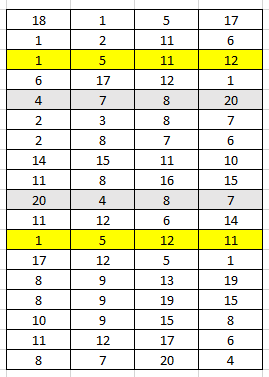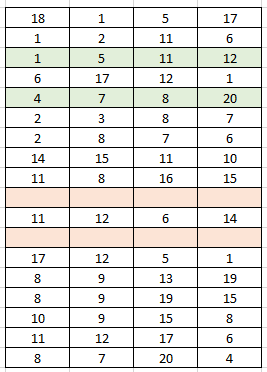Answer the question
In order to leave comments, you need to log in
How to filter an array of objects by occurrence?
There is such a table

AND this table in the form of objects, one object = one row of the table:
var list = [
{ "n1": 18, "n2": 1, "n3": 5, "n4": 17 },
{ "n1": 1, "n2": 2, "n3": 11, "n4": 6 },
{ "n1": 1, "n2": 5, "n3": 11, "n4": 12 },
{ "n1": 6, "n2": 17, "n3": 12, "n4": 1 },
{ "n1": 4, "n2": 7, "n3": 8, "n4": 20 },
{ "n1": 2, "n2": 3, "n3": 8, "n4": 7 },
{ "n1": 2, "n2": 8, "n3": 7, "n4": 6 },
{ "n1": 14, "n2": 15, "n3": 11, "n4": 10 },
{ "n1": 11, "n2": 8, "n3": 16, "n4": 15 },
{ "n1": 20, "n2": 4, "n3": 8, "n4": 7 },
{ "n1": 11, "n2": 12, "n3": 6, "n4": 14 },
{ "n1": 1, "n2": 5, "n3": 12, "n4": 11 },
{ "n1": 17, "n2": 12, "n3": 5, "n4": 1 },
{ "n1": 8, "n2": 9, "n3": 13, "n4": 19 },
{ "n1": 8, "n2": 9, "n3": 19, "n4": 15 },
{ "n1": 10, "n2": 9, "n3": 15, "n4": 8 },
{ "n1": 11, "n2": 12, "n3": 17, "n4": 6 },
{ "n1": 8, "n2": 7, "n3": 20, "n4": 4 }
]
Answer the question
In order to leave comments, you need to log in
I propose to make a JSON serialization of an array of sorted values as a "fingerprint" of the string.
Then both will result in one hash:
{ "n1": 1, "n2": 5, "n3": 11, "n4": 12 } => "[1,5,11,12]"
{ "n1": 1, "n2": 5, "n3": 12, "n4": 11 } => "[1,5,11,12]"const makeHash = (obj) => JSON.stringify(Object.values(obj).sort((a, b) => a - b));
const hashes = list.map(makeHash);
const result = list.filter((el, i) => i === hashes.indexOf(makeHash(el)))[
{
"n1": 18,
"n2": 1,
"n3": 5,
"n4": 17
},
{
"n1": 1,
"n2": 2,
"n3": 11,
"n4": 6
},
{
"n1": 1,
"n2": 5,
"n3": 11,
"n4": 12
},
{
"n1": 6,
"n2": 17,
"n3": 12,
"n4": 1
},
{
"n1": 4,
"n2": 7,
"n3": 8,
"n4": 20
},
{
"n1": 2,
"n2": 3,
"n3": 8,
"n4": 7
},
{
"n1": 2,
"n2": 8,
"n3": 7,
"n4": 6
},
{
"n1": 14,
"n2": 15,
"n3": 11,
"n4": 10
},
{
"n1": 11,
"n2": 8,
"n3": 16,
"n4": 15
},
{
"n1": 11,
"n2": 12,
"n3": 6,
"n4": 14
},
{
"n1": 17,
"n2": 12,
"n3": 5,
"n4": 1
},
{
"n1": 8,
"n2": 9,
"n3": 13,
"n4": 19
},
{
"n1": 8,
"n2": 9,
"n3": 19,
"n4": 15
},
{
"n1": 10,
"n2": 9,
"n3": 15,
"n4": 8
},
{
"n1": 11,
"n2": 12,
"n3": 17,
"n4": 6
}
]Didn't find what you were looking for?
Ask your questionAsk a Question
731 491 924 answers to any question